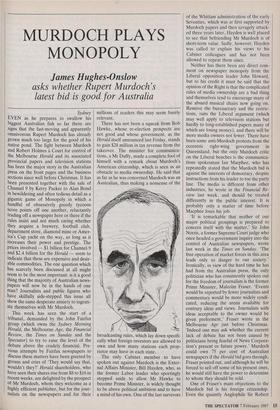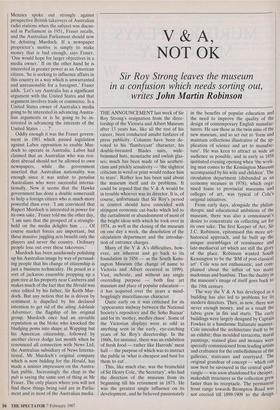MURDOCH PLAYS MONOPOLY
James Hughes-Onslow asks whether Rupert Murdoch's latest bid is good for Australia
Sydney EVEN as he prepares to swallow his biggest Australian fish so far there are signs that the fast-moving and apparently omnivorous Rupert Murdoch has already grown much too large for the good of his native pond. The fight between Murdoch and Robert Holmes a Court for control of the Melbourne Herald and its associated provincial papers and television stations has been the major story in the Australian press on the front pages and the business sections since well before Christmas. It has been presented together with the sale of Channel 9 by Kerry Packer to Alan Bond in bewildering and often tedious detail as a gigantic game of Monopoly in which a handful of obsessively greedy tycoons score points off one another, reluctantly trading off a newspaper here or there if the rules insist and not much caring whether they acquire a brewery, football club, department store, diamond mine or Amer- ica's Cup yacht on the way, so long as it increases their power and prestige. The Prices involved — $1 billion for Channel 9 and $2.4 billion for the Herald — seem to indicate that these are expensive and desir- able commodities. The one question which has scarcely been discussed at all might seem to be the most important: is it a good thing that the majority of Australian news- papers will now be in the hands of one man? Journalists and public figures who have skilfully side-stepped this issue all show the same desperate anxiety to ingrati- ate themselves with Mr Murdoch.
This week has seen the start of a tribunal, demanded by the John Fairfax group (which owns the Sydney Morning Herald, the Melbourne Age, the Financial Review, the Times on Sunday and the Spectator) to try to raise the level of the debate above the crudely financial. Pre- vious attempts by Fairfax newspapers to discuss these matters have been greeted by groans and cries of 'They would say that, wouldn't they?' Herald shareholders, who have seen their shares rise from $8 to $16 in recent weeks, are delighted by the prospect of Mr Murdoch, whom they welcome as a highly efficient publisher, but for the jour- nalists on the newspapers and for their millions of readers this may seem barely relevant.
There has not been a squeak from Bob Hawke, whose re-election prospects are not good and whose government, as the Herald itself announced last Friday, stands to gain $28 million in tax revenue from the takeover. The minister for communica- tions, a Mr Duffy, made a complete fool of himself with a remark about Murdoch's American citizenship, which is seen as an obstacle to media ownership. He said that as far as he was concerned Murdoch was an Australian, thus making a nonsense of the broadcasting rules, which lay down specifi- cally what foreign investors are allowed to own and how many stations each prop- rietor may have in each state.
The only Cabinet member to have spoken out against Murdoch is the Exter- nal Affairs Minister, Bill Hayden, who, as the former Labor leader who sportingly stepped aside to allow Mr Hawke to become Prime Minister, is widely thought to be above political ambition and to have a mind of his own. One of the last survivors of the Whitlam administration of the early Seventies, which was at first supported by Murdoch papers and then savagely attack- ed three years later, Hayden is well placed to see that befriending Mr Murdoch is of short-term value. Sadly, however, Hayden was called to explain his views to his Cabinet colleagues and has not been allowed to repeat them since.
Neither has there been any direct com- ment on newspaper monopoly from the Liberal opposition leader John Howard, but to his credit it must be said that the opinion of the Right is that the complicated rules of media ownership are a bad thing and themselves tend to encourage many of the absurd musical chairs now going on. Remove the bureaucracy and the restric- tions, runs the Liberal argument (which may well apply to television stations but hardly to long-established papers many of which are losing money), and there will be more media owners not fewer. There have been some anti-Murdoch protests from the eccentric right-wing government in Queensland, but the only Murdoch critic on the Liberal benches is the communica- tions spokesman Ian Macphee, who has repeatedly stated that the Murdoch bid is against the interests of democracy, despite instructions from his leader to toe the party line. The media is different from other industries, he wrote in the Financial Re- view last week, and should be treated differently in the public interest. It is probably only a matter of time before Macphee loses his job.
`It is remarkable that neither of our major political groupings is prepared to concern itself with the matter,' Sir John Norris, a former Supreme Court judge who once headed a government inquiry into the control of Australian newspapers, wrote last week in the Times on Sunday. 'The free operation of market forces in this area leads only to danger to our society.' Ironically, in view of the hard time he has had from the Australian press, the only politician who has consistently spoken out for the freedom of journalists is the former Prime Minister, Malcolm Fraser. 'Events would be reported by fewer journalists and commentary would be more widely syndi- cated, reducing the arena available for contrary ideas and views. Journalists with ideas acceptable to the owner would be given preferment,' Fraser wrote in the Melbourne Age just before Christmas. `Indeed one may ask whether the current lack of debate has not been caused by politicians being fearful of News Corpora- tion's present or future power.' Murdoch could own 75 per cent of Australian newspapers if the Herald bid goes through, Fraser pointed out, and although he will be forced to sell off some of his present ones, he would still have the power to determine to whom they should be sold.
One of Fraser's main objections to the Murdoch bid is his foreign citizenship. Even the quaintly Anglophile Sir Robert Menzies spoke out strongly against prospective British takeovers of Australian radio stations when the subject was discus- sed in Parliament in 1951, Fraser recalls, and the Australian Parliament should now be debating Murdoch. If a newspaper proprietor's motive is simply to make money that is bad enough, says Fraser. `One would hope for larger objectives in a media owner.' If on the other hand he is interested in greater power as an American citizen, 'he is seeking to influence affairs in this country in a way which is unwarranted and unreasonable for a foreigner,' Fraser adds. 'Let's say Australia has a significant argument with the United States and that argument involves trade or commerce. Is a United States owner of Australia's media going to be interested in advancing Austra- lian arguments or is he going to be in- terested in advancing the interests of the United States . . . ?'
Oddly enough it was the Fraser govern- ment in 1981 which passed legislation against Labor opposition to enable Mur- doch to operate in Australia. Labor had claimed that an Australian who was resi- dent abroad should not be allowed to own newspapers, while the government asserted that Australian nationality was enough since it was unfair to penalise Australians who were successful interna- tionally. Now it seems that the Hawke government has done a double somersault to help a foreign citizen who is much more powerful than ever. 'I am convinced that Rupert Murdoch is interested in power for its own sake,' Fraser told me the other day, `I am sure that the prospect of a strangle- hold on the media delights him . . . Of course market forces are important, but these massive juggling acts benefit only the players and never the country. Ordinary people lose out over these takeovers.'
Murdoch has been assiduously polishing up his Australian image by way of persuad- ing people that his change of citizenship is just a business technicality. He posed in a sort of jackaroo ensemble propping up a gum tree at his property near Canberra and makes much of the fact that the Herald was once edited by his father, Sir Keith Mur- doch. But any notion that he is driven by sentiment is dispelled by his declared intention to get rid of the ailing Adelaide Advertiser, the flagship of his original group. Murdoch once had an enviable reputation as the bloke who knocked the bludging poms into shape at Wapping but his American citizenship, followed by another clever dodge last month when he renounced all connection with News Ltd, the Australian subsidiary of News Interna- tional, Mr Murdoch's original company which is now bidding for the Herald, has made a sinister impression on the Austra- lian public. Increasingly the chap in the pub is saying the same sort of thing as Mr Fraser. The only places where you will not find these things being said are in Parlia- ment and in most of the Australian media.



















































 Previous page
Previous page